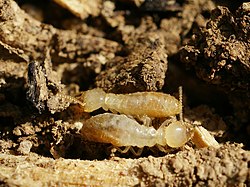Rhinotermitidae
Family of termites From Wikipedia, the free encyclopedia
Rhinotermitidae is a family of wood-soil interface feeding termites commonly known as the Subterranean termites. Many members of this family are known pests that can cause extensive damage to buildings or other wooden structures. Most species establish colonies in wood before migrating to the ground to create diffuse nests connecting to multiple pieces of wood, with some taxa such as Coptotermitinae creating mounds or centralized carton nests within wood. All members forage via shelter tubes through the soil to sources of food. In addition, Rhinotermitidae are known for having a higher level of social complexity as compared to other termites. Communication takes place through chemical activity, more specifically through traces of cuticular hydrocarbon (CHC), or semiochemicals, acting as pheromones to send signals to the king and queen of the nest (Anne-Geneviève Bagnères; Edward Vargo, 2019). About 345 species are recognized, among these are severe pests such as Coptotermes formosanus, Coptotermes gestroi, and Reticulitermes flavipes.
| Rhinotermitidae | |
|---|---|
 | |
| Reticulitermes banyulensis | |
| Scientific classification | |
| Domain: | Eukaryota |
| Kingdom: | Animalia |
| Phylum: | Arthropoda |
| Class: | Insecta |
| Order: | Blattodea |
| Infraorder: | Isoptera |
| Nanorder: | Neoisoptera |
| Family: | Rhinotermitidae Froggatt, 1897 |
| Subfamilies | |
| |
Subfamilies and Genera
WikiSpecies and the Termite Catalogue[1] list the following:
Coptotermitinae
Auth.: Holmgren, 1910
Heterotermitinae
Auth.: Froggatt, 1897 (synonym Leucotermitinae Holmgren, 1910a)
- Heterotermes
- Reticulitermes
- Tsaitermes
Prorhinotermitinae
Auth.: Quennedey & Deligne, 1975
Psammotermitinae
Auth.: Holmgren, 1911 (Note: Holmgren included this taxon in "family Mesotermitidae")
Rhinotermitinae
Auth.: Froggatt, 1897
- Acorhinotermes
- Dolichorhinotermes
- Macrorhinotermes
- Parrhinotermes
- Rhinotermes
- Schedorhinotermes
Termitogetoninae
Auth.: Holmgren, 1910
- Termitogeton
incertae sedis
References
External links
Wikiwand - on
Seamless Wikipedia browsing. On steroids.
